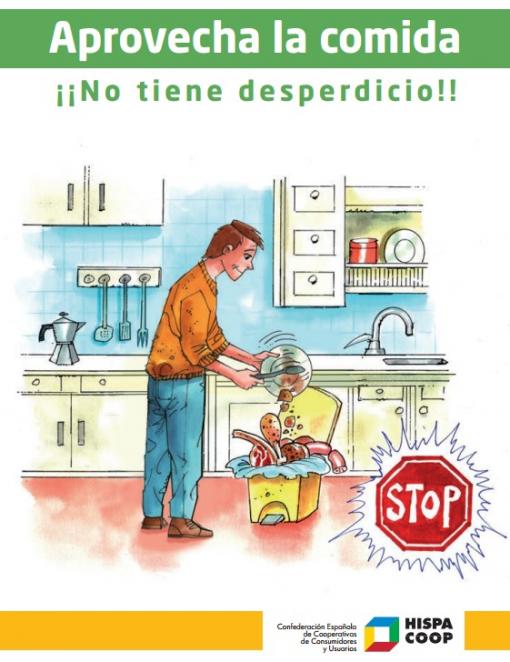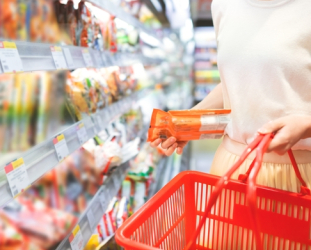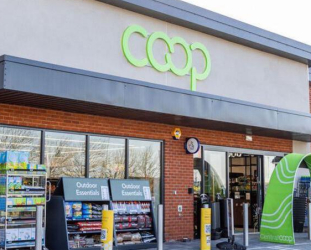Euro Coop Contribution to the Debate on food waste

Euro Coop Contribution to the Debate on food waste
05 April 2013
1. Context
Economic progress in the 20th century has spread access to food and higher quality to the majority of population in industrialised countries. The average consumer currently devotes less disposable income to the purchase of food, which is available in huge quantities at relatively low prices. This increase in consumption magnifies disposable waste, too. Food waste in industrialised countries accounts for 40% (1) and occurs mainly at retail and consumer level, whereas, in developing countries, it occurs at post-harvest and processing levels.
2. Negative consequences of food waste
Action should be taken urgently to address food waste due to its negative impacts. First of all, it has an environmental impact. Every tonne of food that gets wasted releases 3.8 tons of CO2 equivalent emissions, water that has been used to farm becomes waste and decomposition of food waste releases methane into the atmosphere. Furthermore, we are wasting energy. Food waste has an economic impact, as the cost of the food that is not consumed accounts for around 500 euros per person. Food waste has also an ethical and social impact, with around 1 billion people suffering from hunger around the world, 300 million obese and 1 million overweight. Others suffer diseases due to overnutrition.
3. Identifying food waste reduction strategies
Consumer co-operatives in Europe estimate that around 39% of food waste occurs due to overproduction or products that are in bad condition. The 14% of waste that takes place in the food service and catering sectors is attributed to miscalculation of the size of portions, the difficulty in estimating the number of customers and the rejection of leftovers. Furthermore, 5% of the food waste that takes place in the distribution stage comes from incorrect handling, packaging and damage during transport.
From the very beginning, priority should be given to the prevention and reduction of food waste, recycling, redistribution for animals or people and conversion into bioenergy; ethanol, biogas, or biological treatment (compost). At consumer level, food waste occurs because there are leftovers, food surplus or products that have passed their best before date. According to the figures from the Study on “food waste in households”(2) of the Spanish Consumer Co-operative Association, HISPACOOP, the average household waste is as follows: around 20% of bread, cereals and bakery, around 17% of fruit and green vegetables, around 13% milk and dairy products, around 13% of pasta, rice and vegetables, around 7.4% of drinks, around 6% of meat, around 6% of precooked dishes, around 4% of sausages and cold meat, around 4% of snacks, around 4% of canned food, around 3% of fish and seafood and around 3% of eggs.
In many cases, food waste could be avoided if consumers were better informed. Food waste occurs in households for many reasons:
- Consumers encounter difficulties understanding food labelling (best before and use by date). Our members have realised that food waste accumulation was reduced by applying price reduction practices so that products approaching their “best before” date are sold at a discount. Indeed, Euro Coop believes that there should be harmonisation of date labels, including the clarification of the terms “best before” and “use by”. Consumers refrain from using products that might be still in good condition because of food safety concerns. They should be able to make the right choice and for that, they have to be informed and understand that the “best before” label is related to the quality of the product, whereas the “use by” date is related to safety. Other members have organised campaigns that provide advice on menu planning or explain the meaning of the labels “use by”.
- Consumers sometimes over-purchase and do not plan in advance their shopping lists. Consumer co-operatives are taking action to raise awareness and help to better plan the shopping lists of consumers so that they buy what will be eventually cooked or consumed. Supermarkets should endeavour to make available at the point of sale a larger range of portion sizes, suitable for different types of households and individual consumers. Our members have also been implementing measures leading to food waste reduction in points of sale and in restaurants since oversized portions end up in the biowaste bin.
- Consumer co-operatives consider the EU class system as inefficient. Food is rejected due to cosmetic reasons during the food supply chain and even though it can be used for other purposes than human food, there is a still a huge quantity left to rot.
- Consumers fail to store food properly. Euro Coop believes that raising awareness among consumers to inform them on how to store food is crucial conserving products for longer periods of time. Consumer co-operatives are developing mechanisms to control temperatures in warehouses to keep products fresh and in good condition for longer periods.
- Consumers fail to reuse leftovers because they don’t know how to keep them. Consumers need information on how to organise, use and freeze leftovers; otherwise they will continue to throw leftovers away due to safety risks. Once the consumer learns to keep leftovers, he or she has to understand the possibilities of using these leftovers. To help consumers, members of Euro Coop have been, for example, sponsoring competitions among professional chefs using leftovers to raise awareness on their potential.
- Restaurants serve oversized portions and consumers leave them on their plates to go to the bin, instead of asking for a doggy bag or leftover box to bring them home. According to the Sustainable Restaurant Association, a restaurant in London produces up to 21 tons of food waste every year. The UK has organised campaigns to reduce the amount of food waste in restaurants with the aim of convincing consumers to bring home leftovers from restaurant dinners. We think that the European Union should adopt this example as a good practice and involve local councils to organise similar campaigns.
As for the food waste occurring at the retail level, consumer co-operatives have been developing projects aimed at recovering unsold food products that are still edible and donating them to food banks for people in need with the involvement of NGOs. Euro Coop also proposes to explore the possibility of reaching an agreement with the farming sector so that this food waste can be used to feed animals within the EU rules.
4. Constraints
Despite the success of information campaigns such as “Love Food Hate Waste” in the United Kingdom, food waste continues and consumer co-operatives encounter different kinds of economic, technical and health constraints. In regards to economic constraints, buying in bulk is always cheaper. Retailers display large quantities in stores and different brands because buying large quantities from manufacturers entails more attractive prices. At the same time, consumers expect to find a wide range of products on the shelves. Food products close to expiration are often ignored by consumers. There are also technical constraints related to inefficient transportation, storage and packaging. Health constraints involve, for example, spoiled food considered as such even when still edible.
Despite the constraint to reach a zero food waste target, consumer co-operatives collaborate with NGOs to donate unsold fresh products to food banks or associations which distribute food for people.
5. What can the EU do?
We believe that a harmonised definition is needed on food waste at EU level to be able to distinguish what organic waste is food waste. It is also important to increase and harmonise the collection of data between Member States to compare the reduction of food waste. So far, Member States are free to choose the methodology for collecting and calculating the food waste data submitted to Eurostat.
We call on the European Commission to set indicative targets for the reduction of food waste in order to measure progress once reliable data exists.
Euro Coop is convinced that there is a scope to take action at EU level and that many of the measures implemented within co-operatives could be applied throughout the food supply chain. The European Union could implement education and information campaigns to raise awareness among citizens, following the example of European consumer co-operatives. Indeed, education and information represent one of the principles of consumer co-operatives, as consumer-owned and democratically controlled enterprises.
The European Union has a role to play in promoting organic recycling by involving municipalities to organise a system of organic waste treatment for households or restaurants, with free pick up so that selected organic waste can be collected for recycling.
Euro Coop would welcome the declaration of 2014 as the “European Year against food waste" as suggested by the European Parliament, with the aim of raising awareness among European citizens about the importance of this problem and modifying consumer behaviours.
The EU must strengthen its efforts in multinational fora and push other countries to increase awareness on the negative effects of food waste. If nations commit to halve poverty within the Millennium Development Goals by 2015, they cannot ignore that food waste in their countries could be part of this unfortunate population suffering hunger.
We call for the constitution of a Forum at EU level gathering all the discussions around the issue on food waste, with the aim of not duplicating efforts and concentrating energy in a single group where all stakeholders in the food chain are involved to give their say on Commission initiatives and proposals.
Consumers need a better understanding of labelling to distinguish the difference between “best before", "display until" and “use by”. We call on the European Union to start a debate on possible improvements that could be undertaken in the upcoming years. We also believe that consumers need more information on how to store food, which could also appear on the label.
Euro Coop recommends the European Commission to take measures at the fiscal level to grant VAT exemptions to those products that are donated to Food banks and that therefore do not constitute an economic profit for the retailer.
We call on the European Commission to take note of these key suggestions and to use these elements as input for the upcoming Communication on Sustainable Food. We ask the Commission to recognise the efforts already made by consumer co-operatives to reduce food waste and redistribute unsold food to people in need.
A cultural change is necessary. Our society wastes resources and we should change the behaviour and attitude towards the environment. The European Union should engage citizens in developing a sustainable future and explain the long-term advantages of putting the maximum amount of resources to use.
ANNEX – Consumer Co-operatives Good Practices in Tackling Food Waste
The Co-operative Group (United Kingdom) - The Co-operative Group prints storage instructions for fruits and vegetables on fresh produce bags, and has committed to increasing its work with charities such as Fareshare, which distributes surplus food from retailers to people and communities suffering from food poverty across the UK. In 2011, The Co-operative Group redistributed an estimated 29 tonnes of food via Fareshare from four depots.
The S Group (Finland) – In the S Group’s stores the quality of fruit and vegetables is systematically evaluated. Turnaround and temperature control in warehouses is being continuously improved in order to keep the products fresh and in good condition for as long as possible. Also, at the beginning of 2007 S Group supermarkets harmonised their price reduction practices so that all products approaching their “best before” date are sold at a discount. In 2011, the Kilo logistics centre that belongs to the S Group sent its packaged and unpackaged biowaste to bioenergy production. Other co-operatives belonging to the S Group are engaged in similar initiatives with local companies specializing in bioenergy production. For example, a considerable proportion of unsold bakery products from regional co-operatives HOK-Elanto and Hämeenmaa ends up in bioethanol production. The same bioethanol is used as raw material for the biocomponent of the ABC chain’s biopetrol. Thanks to these actions, the S Group complies with the animal by-product decree which entered into force in March 2011. At the same time, the S Group has developed more initiatives to enhance sorting and consumer guidance. This has contributed greatly to a reduction of the amount of landfill waste.
Coop Norway – It is engaged in a business-led project on food waste that aims at reducing the amount of edible food waste by 25 % before 2015.
Coop Italy – It has promoted since 2009 the ‘Buon fine’ (‘Good end’) project which aims at recovering still edible, unsold food products and donating them to charities and people in need. This project, carried out on a national level, is managed locally by the co-operatives. In 2011 it involved 471 shops, ten superstores and 20 supermarkets and allowed the donation of 276 tonnes of food products that accounted for an overall economic value of 1,556,864 Euros.
Eroski (Spain) – Fifteen years ago, Eroski launched its first project to collect food for the most disadvantaged, and in 2011, it again collaborated with the Spanish Federation of Food Banks (FESBAL) to organise a campaign during which consumers could donate food products at in-store collection points. Eroski normally carries out two food collection campaigns every year in spring and at Christmas, but in 2011 it launched an emergency campaign in May and June in response to the earthquake in Lorca, with all donations going to the Red Cross. The Christmas campaign was very successful and nearly 100,000 kilos of food were collected. Eroski stores even donated food directly: almost 492,000 kilos of damaged goods (products with deformed packaging, for example) and more than 217,000 kilos of fresh food products. Eroski’s commitment to freshness means that foods are delivered daily. Yoghurts, desserts, eggs and sliced bread are removed from sale sufficiently in advance of their best before date to provide the time margins necessary for the donated products to reach their final destination in perfect condition. Eroski has strengthened the elements in the refrigeration chain and collaborated with FESBAL in order to guarantee the products’ freshness.
Latest News

EU Commission Presents New Five-Year Consumer Policy Roadmap
The EU Commission has unveiled its new five-year roadmap for consumer policy, outlining...

Euro Coop Co-Signs Joint Position Paper on Omnibus I
Euro Coop, together with CNA , Legacoop and ECCO , has released a joint position paper in...

Euro Coop is seeking an Erasmus+ Policy Intern
Euro Coop – The European Community of Consumer Co-operatives is seeking a Policy Intern...
Latest Stories

OurCoop: A New Era for the UK Co-operative Movement
Euro Coop welcomes the official launch of OurCoop , the new co-operative society formed...

UN Recognises Cooperatives with Decadal International Year
Euro Coop warmly welcomes the United Nations General Assembly’s historic resolution to...

Skupina COOP Wins at the European Commerce Awards 2025
Euro Coop warmly congratulates Skupina COOP , our member from the Czech Republic, for winning...

